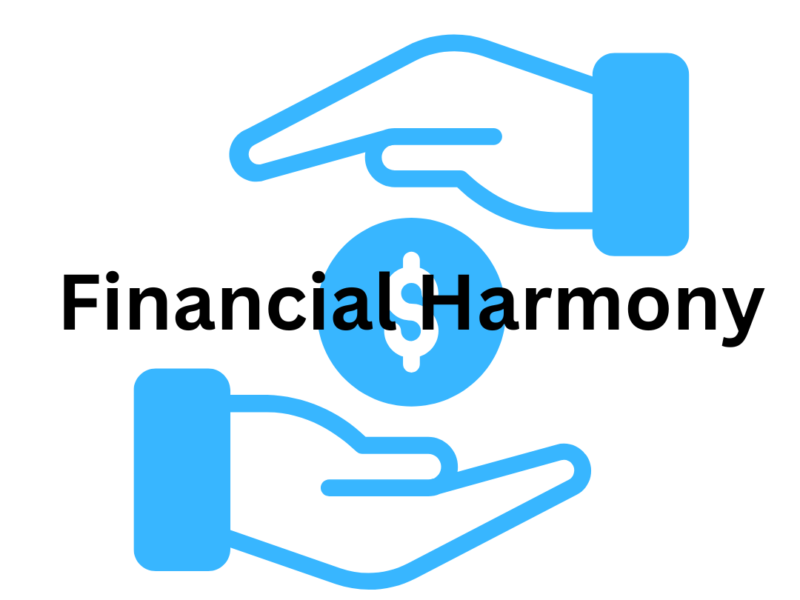Introduction: Talking Money with Your Partner; Open Communication for Financial Harmony
In any healthy relationship to achieve financial harmony, open communication is the bedrock of trust and understanding. But when it comes to finances, many couples shy away from this crucial conversation.
Talking about money can feel awkward, even intimidating. Yet, financial transparency is essential for building a strong foundation for your future together. This guide will equip you with the tools to navigate these conversations effectively, fostering financial harmony and strengthening your relationship.

Benefits of Open Communication about Money
Before going into specifics, let’s explore the rewards of financial harmony with open financial communication. Here’s what you gain by talking money with your partner:
- Building Trust: Sharing financial information fosters trust and vulnerability. You demonstrate a willingness to collaborate on a vital aspect of your lives.
- Achieving Financial Goals Together: Discussing financial aspirations allows you to create a roadmap for achieving them. Whether it’s saving for a dream vacation, a down payment on a house, or a comfortable retirement, working as a team makes success more likely.
- Reducing Stress: Financial anxieties are a major source of stress for many couples. Open communication allows you to address concerns proactively and create a plan to manage them together.
- Making Informed Decisions: Discussing finances encourages collaborative decision-making. You can make informed choices about budgeting, spending, and long-term financial planning, ensuring both partners feel heard and respected.
Setting the Stage for a Productive Financial Conversation
The key to a successful money talk lies in creating the right environment. Here’s how:
- Choose the Right Time and Place: Avoid initiating this conversation when stressed, tired, or during a disagreement. Pick a neutral time when you’re both relaxed and free from distractions. Find a comfortable setting conducive to open communication, like your living room or a quiet cafe.
- Approach the Conversation with the Right Mindset: Shift your focus from judgment to collaboration. This is a team effort, so put aside any accusatory language or blame games. Frame the conversation as an opportunity to understand each other’s perspectives and build a plan together.
Key Financial Areas to Discuss
Now that the stage is set, let’s delve into the key areas to explore:
Understanding Each Other’s Financial Background:
- Past Financial Experiences: Money carries emotional baggage. Discuss where your parents’ or caregivers’ approach to money may have influenced your own views. Did they prioritize saving? Were they big spenders?
- Current Financial Picture: Be transparent about your current financial situation. Share any existing debts, savings accounts, investments, and credit card balances. This fosters openness and avoids unpleasant surprises down the line.
Identifying Financial Goals (Short-Term and Long-Term):
- Individual Goals: Make space for each other’s aspirations. Do you have student loan repayments you want to tackle? Is your partner saving for a specific professional certification?
- Shared Goals: Discuss your (shared) financial goals. Do you dream of traveling the world together? Is buying a house a priority for your family? Prioritize these goals together, considering their timelines and financial implications.
- Developing a Plan: With your goals identified, brainstorm ways to achieve them. This might involve revising your spending habits, increasing your income, or exploring investment opportunities.
Spending Habits and Budgeting:
- Transparency is Key: Be upfront about your spending habits. Share recent bank statements or credit card summaries to show where your money goes. Don’t judge each other; the goal is to gain a clear picture of your current financial landscape.
- Finding Common Ground: Discuss areas where you can adjust your spending to align with your financial goals. Maybe you can find more affordable alternatives for entertainment or groceries.
- Creating a Budget Together: Develop a budget that reflects your combined income, shared expenses, and individual savings goals. There are many budgeting methods available – the 50/30/20 rule, zero-based budgeting, or envelope budgeting – explore them together and find a system that works for both of you.
Building a System for Managing Finances
Now that you’ve established financial goals and a budget, let’s discuss how to manage your money effectively:
- Deciding on a Shared Financial System (Optional): This depends on your comfort level and financial situation. Some couples choose to combine finances into joint accounts, while others prefer to maintain separate accounts for personal spending.
- Joint Accounts: This approach simplifies bill payments and budgeting. It fosters a sense of financial partnership but requires complete trust and transparency.
- Separate Accounts: This can offer a level of financial independence. However, it requires clear communication about who is responsible for which shared expenses (e.g., rent, utilities) and how much each will contribute to (shared) savings goals.
- Establishing Open Communication Channels:
Financial communication shouldn’t be a one-time event. Here’s how to keep the conversation flowing:
- Schedule Regular Check-Ins: Agree on a frequency for discussing finances, be it weekly, monthly, or quarterly. This ensures you’re on the same page regarding spending, saving, and any unexpected financial developments.
- Embrace Open Communication: Encourage open and honest communication about any financial concerns or questions that arise between check-ins. Don’t wait for a problem to snowball before addressing it.
- Revisit and Revise: Life changes, and so will your financial goals and circumstances. Schedule regular reviews of your budget and financial plan to ensure they remain aligned with your evolving needs and aspirations.
Conclusion
Talking money with your partner may not be the easiest conversation to have, but the benefits far outweigh the initial discomfort. Open communication fosters trust, reduces stress, and allows you to build a solid financial foundation together. Remember, financial harmony is a journey, not a destination. By establishing clear communication channels and working collaboratively, you can navigate your financial future with confidence and strengthen your relationship in the process.
Here are some additional tips for a successful money talk:
- Be patient: Don’t expect to solve all your financial issues in one conversation. Be patient with yourselves and each other as you work towards building financial harmony.
- Focus on solutions: Instead of dwelling on past financial mistakes, focus on finding solutions and creating a plan for the future.
- Seek professional help: If you find it difficult to have productive conversations about money on your own, consider seeking guidance from a financial advisor or therapist. They can equip you with communication tools and strategies for navigating complex financial decisions together.
By following these steps and fostering open communication, you can turn money talks into an opportunity for growth, strengthening your relationship and setting yourselves up for a secure and prosperous future together.






